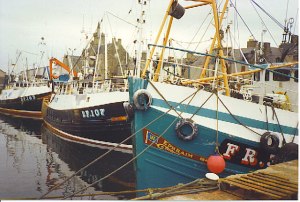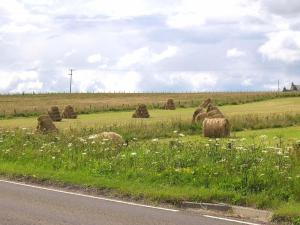A salubrious fashionable suburb; a good neighbourhood; nice houses; respectable neighbours; very desirable! Well – until that young couple got the idea of going green, becoming self-sufficient, digging up the modestly sized rear garden, converting it into an experimental agricultural smallholding – much to the consternation of the snooty next door neighbour. The promise of all sorts of vegetables was bad enough – but a pig on the other side of the fence: that was going beyond a joke. Goodness gracious, it was bound to lower the tone of the neighbourhood and bring down the value of property. Who would want to live in such close proximity to the noise and smell and dirt?
It could never happen, of course, it’s only make-believe and I exaggerate a little. You will have recognised by now that it proved to be excellent material for an extremely successful TV comedy sitcom, The Good Life, with Penelope Keith as the very posh Margo and Paul Eddington as her long-suffering husband. Tom and Barbara Good, played by Richard Briers and Felicity Kendall as slightly eccentric idealists living an “all-green” agenda in pursuit of the good life, were a bit naive perhaps, but great fun. Although we may have watched the numerous repeats on “the box” it doesn’t age with the passing of time or fail to raise a laugh!
The good life is something the majority of folk aim to achieve, although I suspect those who follow the Tom and Barbara agenda are comparatively small – infinitesimal really. Alas, more frequently, the good life is associated with money and the accumulation of wealth. Hence the popularity of TV programmes such as Who wants to be a millionaire? and Pointless. It explains why on a Wednesday and Saturday it takes a longer time than usual to get served when I go for my daily newspaper at the same checkout as those who are lined up to buy their lottery tickets and scratch cards, hoping to capture the good life, or as much of a good life as possible.
If I were asked to give a short definition of the Christian life, I would describe it as a way of life dedicated to the highest good, treading in the footsteps of Jesus Christ, whose example and teaching exemplify the good life. Open my New Testament for assurance, and I’m left in no doubt that to call the life that Jesus offers simply “the good life” does not say it all. The New Testament speaks of it as “Eternal Life”, but the good life is near enough.
Here is what it says in John 3:16: “God loved the world so much that he gave his only Son, so that everyone who believes in him may not die but have eternal life.” (Authorised Version)
And in John 10:10: “I am come that they might have life and that they might have it more abundantly.” (AV)
“I have come in order that you might have life – life in all its fullness.” (GNB)
“I came so that they can have real and eternal life, more and better life than they ever dreamed of.” (The Message)
Tom and Barbara’s good life was never intended to be more than a vehicle of entertainment, comedy and fun. But a brief excursion into the Old Testament, to the first book in the Bible, and to the story of Creation, we read, “The Lord God placed the man in the Garden of Eden to cultivate it and guard / manage it.” (Genesis 2:16) The ecological environment in that day was “green” – how God chose it and made it to be. How Barbara and Tom chose it to be – a better life, the good life, a choice we all face to manage our little patch well when all around us despoil God’s creation, ignoring the consequences and adding to causes of global warming. Were Tom and Barbara blazing a trail? Or do I stretch the imagination too far?
In conclusion – back to where we were before the ecological diversion and to the claim of Jesus that he came that men and women might have life and might have it more abundantly. In his Daily Study Bible, Dr. William Barclay of Glasgow University fame, academic, writer, teacher and preacher, tells us that the Greek phrase used for “having it more abundantly” means to have a superabundance of a thing. “To be a follower of Jesus,” he says, “to know who he is and what he means. When we walk with Jesus there comes a new vitality, a superabundance of life.”
A fitting conclusion!





